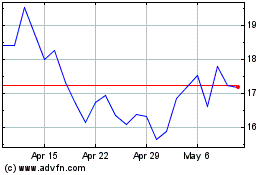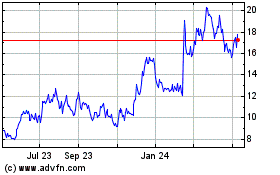Labor Department Finalizes Independent Contractor Rule -- Update
January 06 2021 - 10:07AM
Dow Jones News
By Eric Morath
The Trump administration made it easier for businesses to
classify workers as independent contractors, a victory for
gig-economy companies such as food-delivery and ride-sharing
services.
The Labor Department in a final rule released on Wednesday would
likely make it more difficult for a gig worker, such as an Uber or
DoorDash driver, to be counted as an employee under federal law.
That means those workers wouldn't be covered by federal
minimum-wage and overtime laws, and they could be responsible for
paying the employer portion of Social Security taxes.
The rule won't go into effect until after President-elect Joe
Biden is inaugurated on Jan. 20. The Biden administration could
seek to delay implementing the rule, give new enforcement guidance
or seek to write a new version of the rule. The Biden
administration could also opt to not defend the regulation should
it be challenged in court.
The Labor Department's action follows a 2019 California law that
required businesses to reclassify many contract and gig workers as
employees, giving those workers access to the state's minimum wage
and overtime laws, workers' compensation coverage and paid sick
days. In November, California voters approved a ballot proposition
that exempted Uber Technologies Inc., Lyft Inc., DoorDash Inc. and
similar companies from the law, which would have reshaped their
business model.
"This rule brings long-needed clarity for American workers and
employers, " Labor Secretary Eugene Scalia said. The rule makes it
easier to identify employees covered by federal law, "while
recognizing and respecting the entrepreneurial spirit of workers
who choose to pursue the freedom associated with being an
independent contractor."
Danielle Burr, Uber's head of federal affairs, wrote in October
that the proposal would protect the independent worker status that
"is overwhelmingly preferred by app-based drivers and delivery
people." Business groups, including the Chamber of Commerce,
Associated Builders and Contractors and National Association of
Realtors, backed the rule, saying it would settle long-disputed
worker classifications and allow businesses to use technology to
access labor in new ways.
Labor unions, taxi drivers and workers' advocates were among
those who wrote letters protesting the plan, saying employees often
have access to benefits, including health insurance and retirement
plans, that independent contractors don't have.
Write to Eric Morath at eric.morath@wsj.com
(END) Dow Jones Newswires
January 06, 2021 09:52 ET (14:52 GMT)
Copyright (c) 2021 Dow Jones & Company, Inc.
Lyft (NASDAQ:LYFT)
Historical Stock Chart
From Mar 2024 to Apr 2024

Lyft (NASDAQ:LYFT)
Historical Stock Chart
From Apr 2023 to Apr 2024
